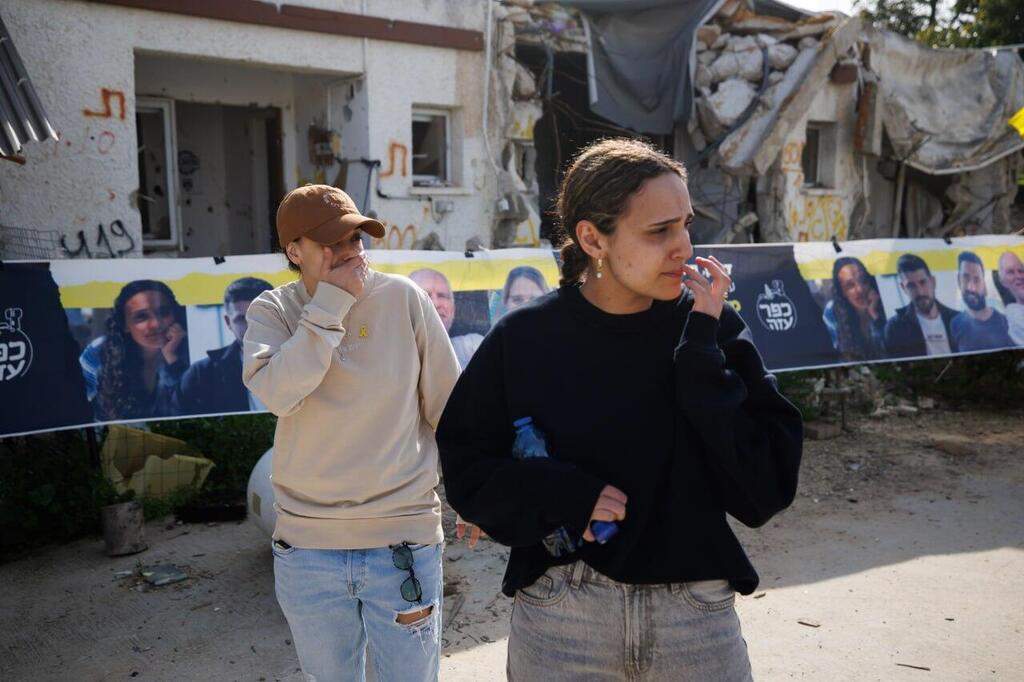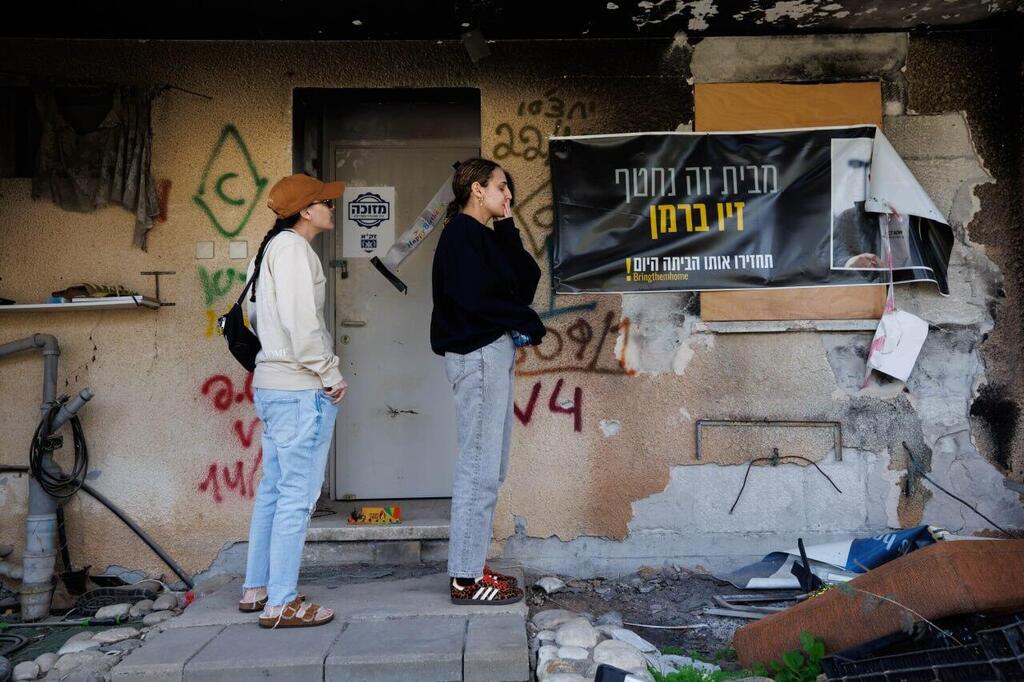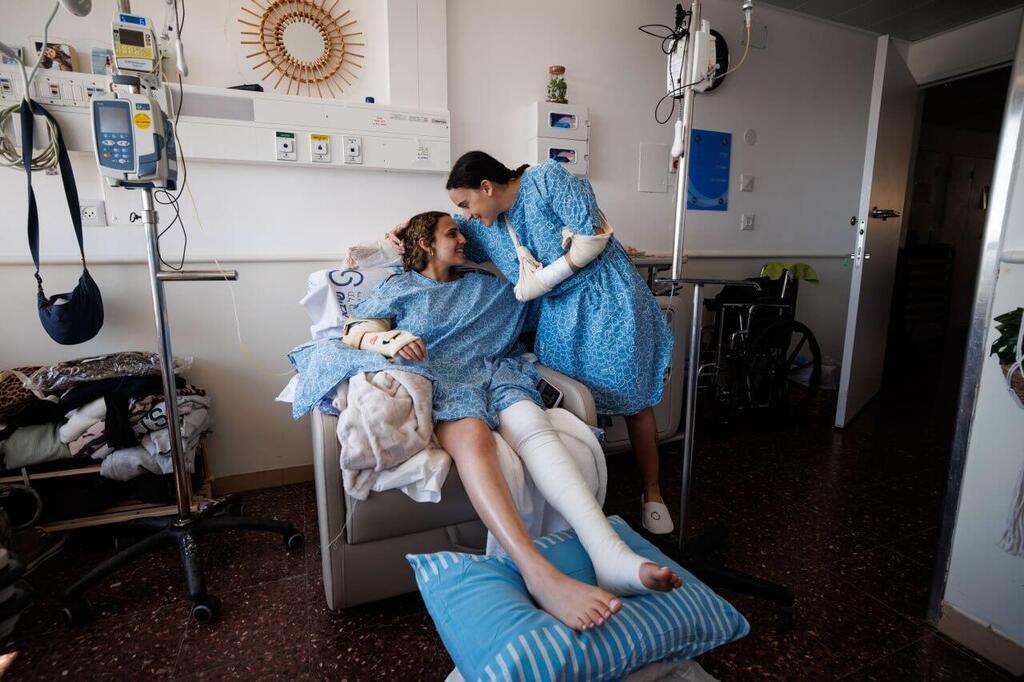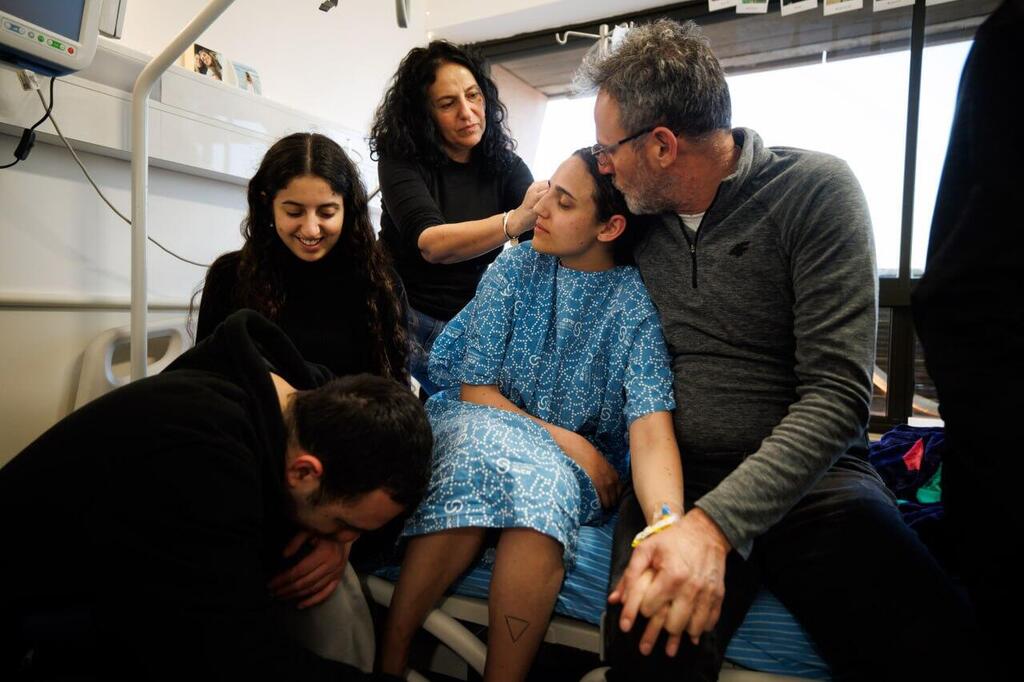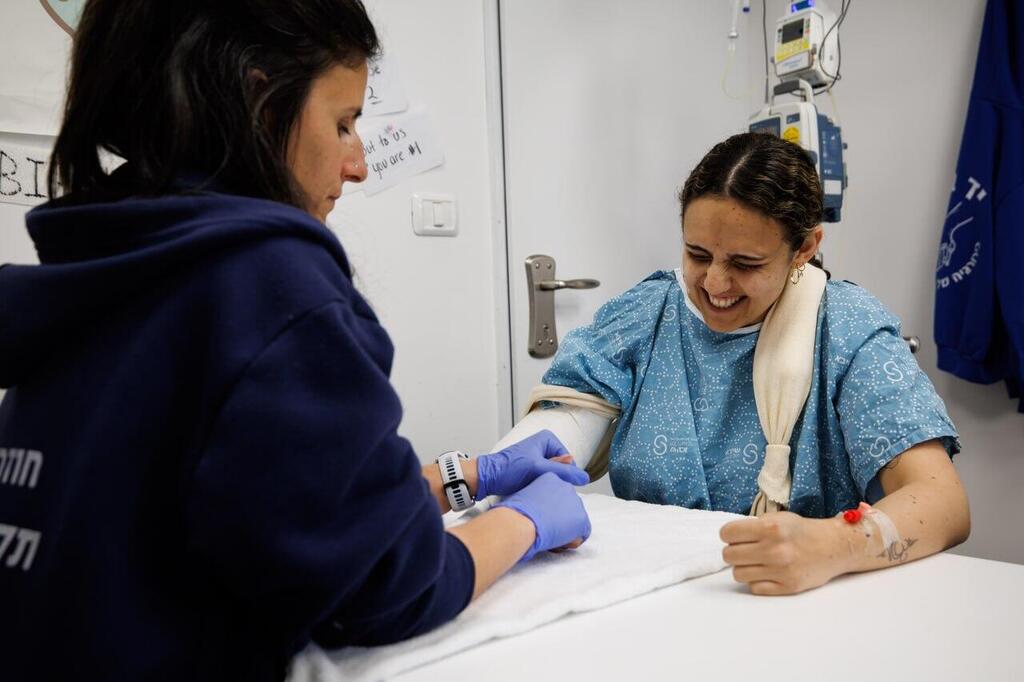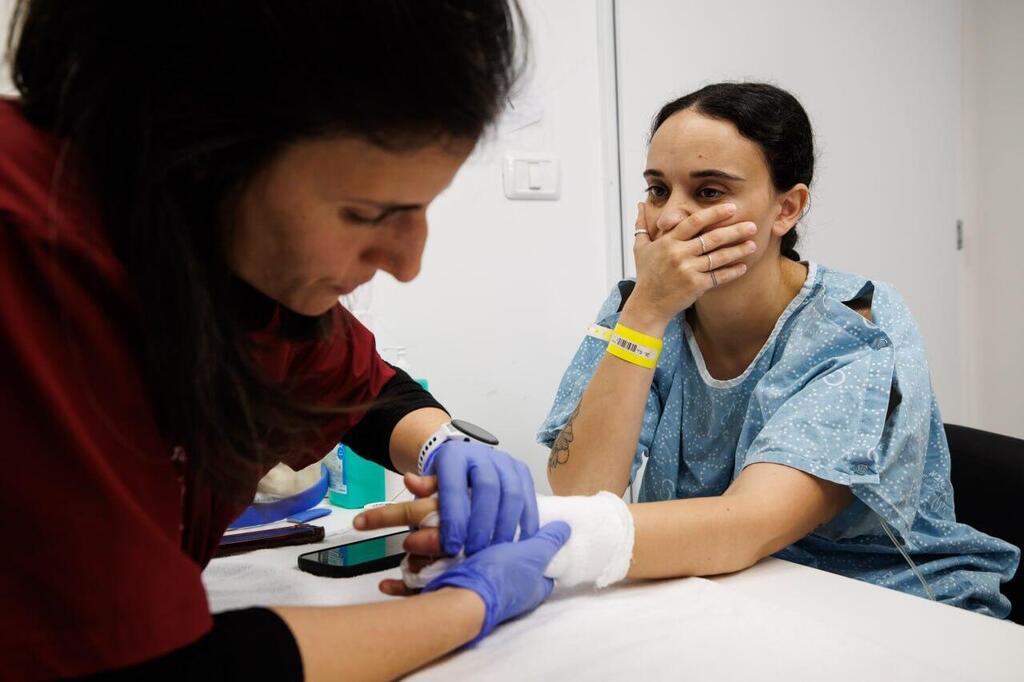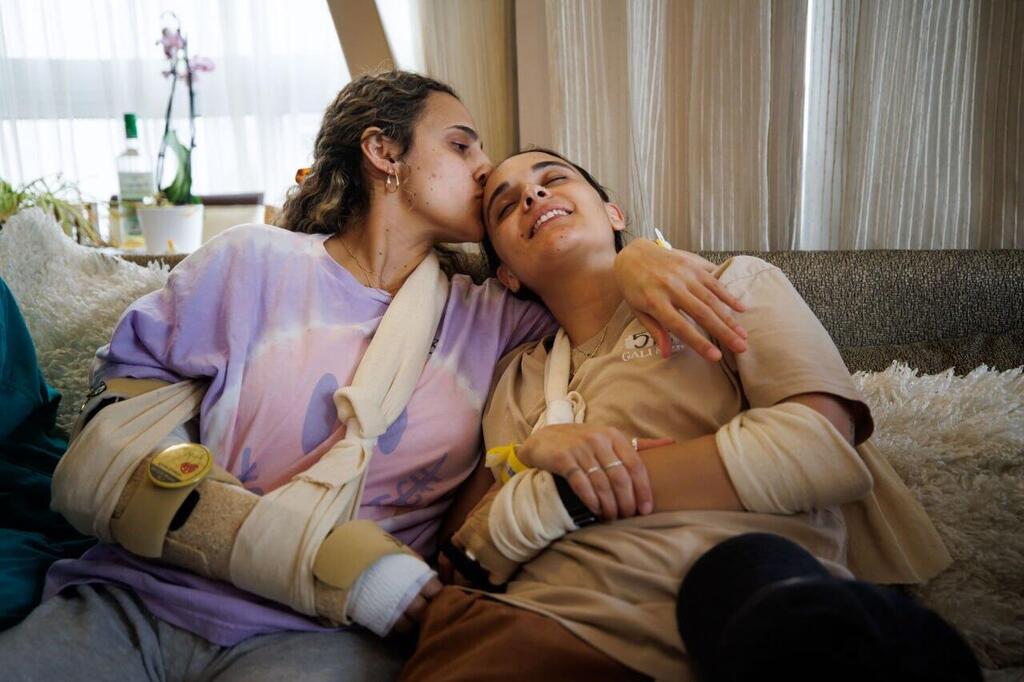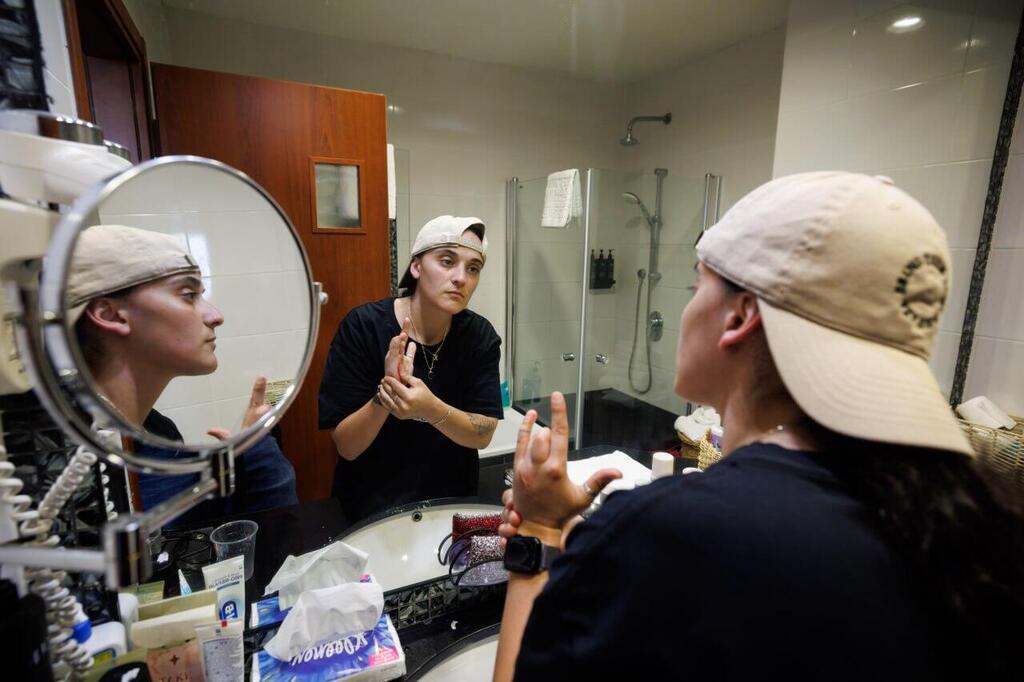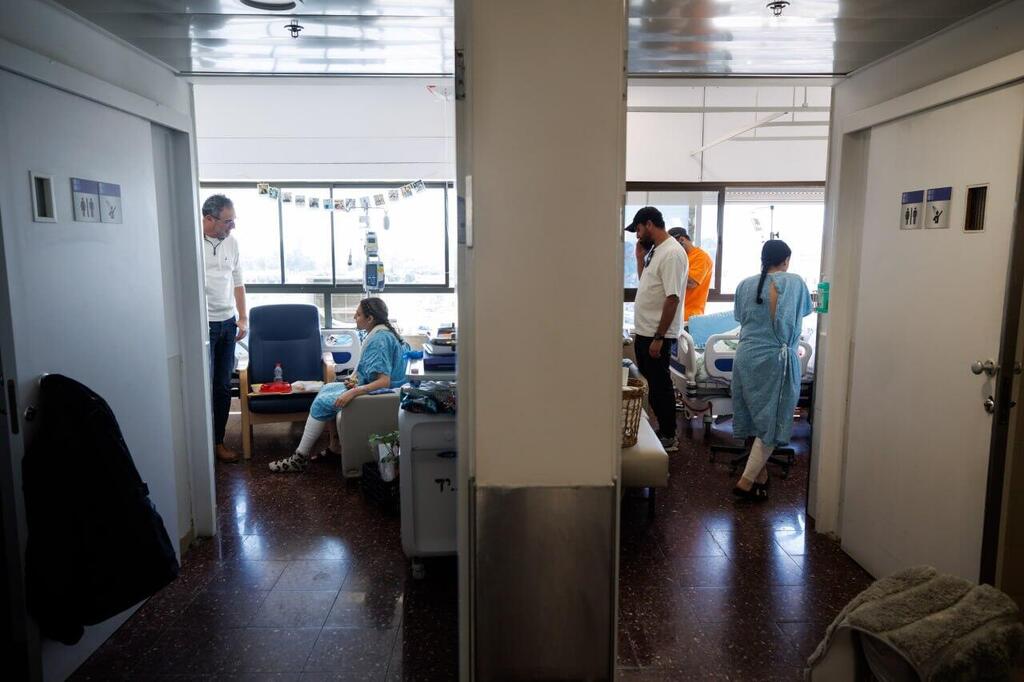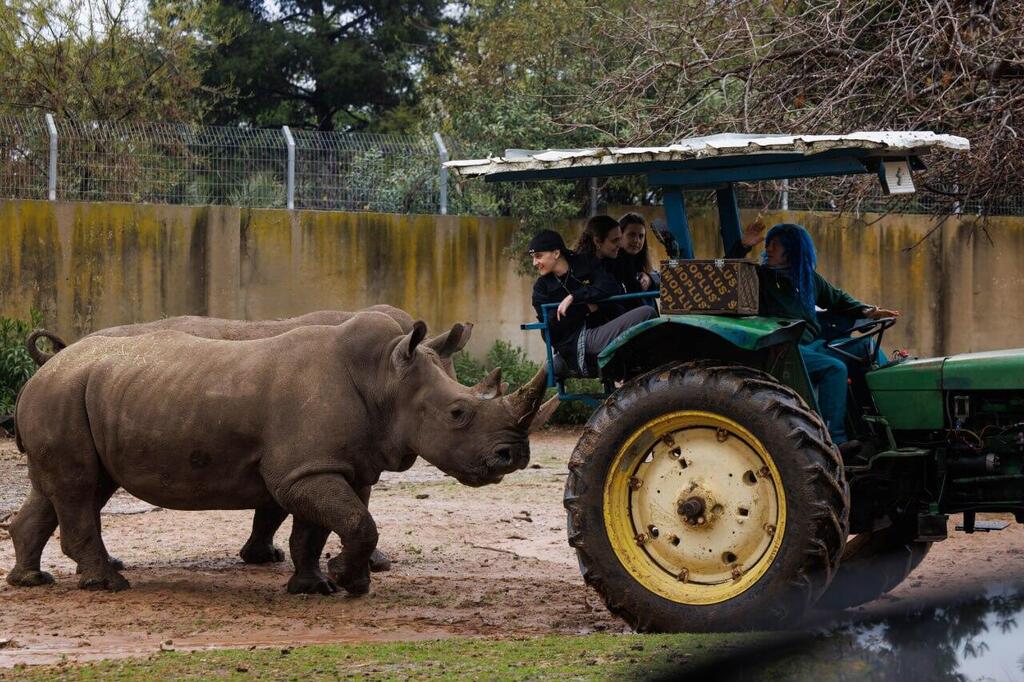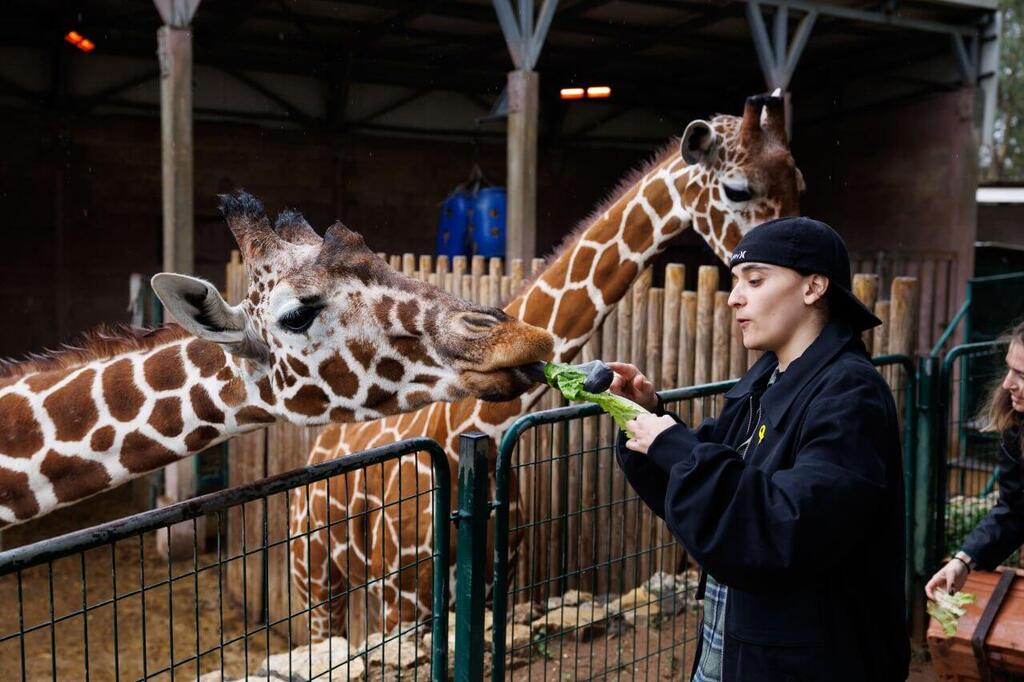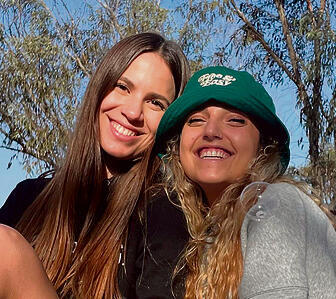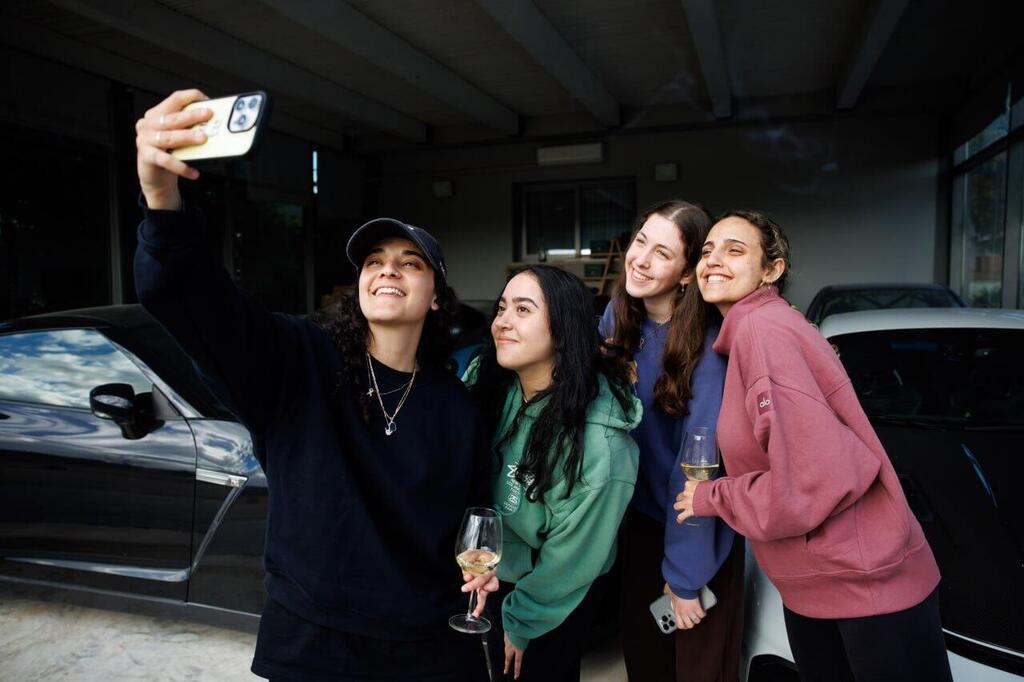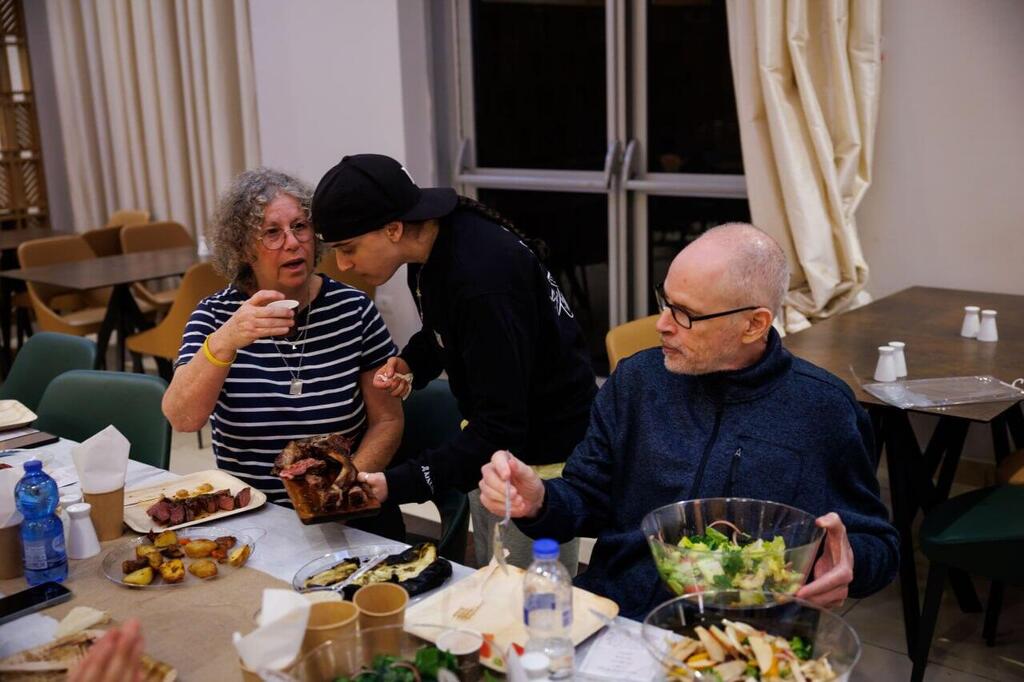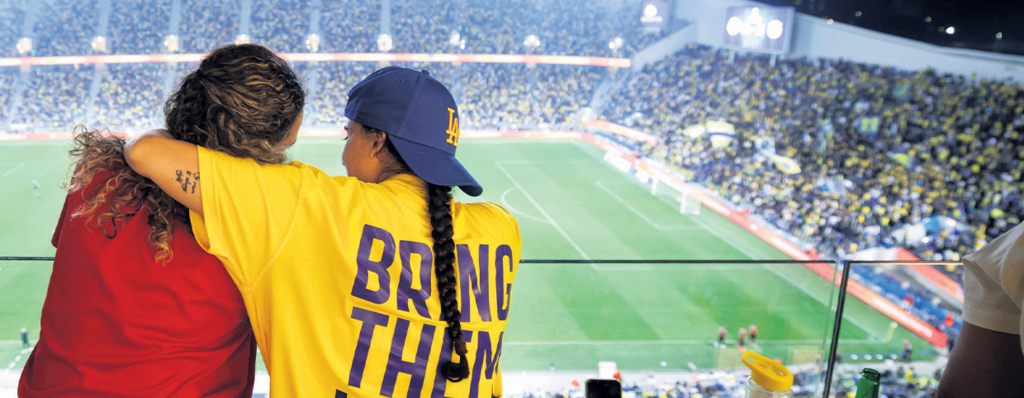Getting your Trinity Audio player ready...
Kfar Aza
“All I could do, while sitting there shot in the leg and arm, was hold on and stay as clear-headed as possible, just to understand what was happening"
Emily: I’m sitting on my destroyed sofa on the porch, explaining to Romi the details of the kidnapping process she already knows by heart. But now, it’s real. Tangible. There’s no way to describe the moment. To walk into the homes that were once my air, my refuge—and see them in ruins, to see the community shattered—it’s heartbreaking. Explaining everything to Romi from within those houses was chilling. It was a very powerful and meaningful moment for both of us.
To remember that moment—when Gali (Berman) was sitting at one end of the couch and Ziv (his twin brother) was across the street—and I realized we were about to be kidnapped... all I could do, while sitting there shot in the leg and arm, was hold on and stay as clear-headed as possible, just to understand what was happening.
22 View gallery


Captivity survivor Emily Damari sits on the couch from which she was kidnapped during the October 7 attack on Kibbutz Aza, pointing to fellow former hostage Romi Gonen
(Photo: Ziv Koren)
Do you imagine the moment you’ll see Gali and Ziv again?
Romi: Definitely. It’s a different kind of connection.
Emily: Wow. I kept thinking about what it would be like if they brought us together there. It didn’t happen. But no—I can’t even imagine it. I don’t know if there’ll be tears, but definitely joy, jumping, champagne in the air, celebrations like nothing else.
Romi: And then, like half an hour later, I’ll also walk into the room and say hi.
Emily: No, they’ll come running straight away, pick you up and say, “Who’s this?!”
Romi: I heard about Kfar Aza for 431 days. All the stories, all the people—I already knew everything. To arrive there with Emily and watch her as we walked, house by house... Suddenly she’d say the name of someone who lived in a home, and I’d finish the story. And everyone around us was in shock—how on earth did I know all that? During the days in captivity, I got to know Emily’s friends as if they were my own. And when we got to their homes, my heart broke. I’m glad she chose me to be with her during such a sad and painful moment—and that I could be there as a source of strength for her.
'The rehabilitation is incredibly tough—physically and emotionally'
Romi: In Gaza, there were a lot of questions—would my arm work again? Would it not? What would happen with my fingers? One thing was certain: none of us imagined how severe the injury actually was. I never expected to undergo a 13.5-hour surgery that was originally estimated at 8 to 10 hours. I never imagined they’d have to sacrifice the function of my leg in order to save my arm. I didn’t think I’d need months of rehabilitation or that I’d face multiple surgeries, not just one. But I’ll get through it—this is what I waited for.
22 View gallery


Romi Gonen undergoes surgery to correct an arm injury left untreated since the October 7 attack
(Photo: Ziv Koren)
22 View gallery


Gonen fights to regain use of her arm through intensive rehabilitation
(Photo: Ziv Koren)
Imagine sitting for a year and five months with an arm injury that renders you completely unable to function and in constant, severe pain. You’d act just like me. I’m strong, and I’m going to fight through this rehab like a beast until my arm regains as much function as it possibly can. The rehabilitation is incredibly tough—physically and emotionally. I meet many wounded soldiers here, and I get so moved by them I can barely speak.
To the IDF soldiers and security forces—I want you to know how much I admire and appreciate you for your insane strength, your courage and your sacrifice. You are the best there is, and the people of Israel are behind you. May we all have the speediest possible recovery, with God’s help.
Emily on Romi
"Her spirit, combined with mine, was our strength—both above ground and below"
Everyone knows that Romi and I were together for 431 days, but in truth, we never actually spent a moment apart. It started on October 7, after the horrific surgeries we underwent in Gaza. We both woke up from anesthesia in Al Shifa Hospital. She overheard the doctor tell me I’d lost two fingers, and I responded, “Okay,” because really—what else can you say? Then Romi asked me what my name was. I answered and asked hers in return. When she said she was from Kfar Vradim, I panicked—I thought Hamas had reached the north.
Thirty-nine days later, we met again in the tunnels—and from then on, we were never apart. The friendship between me and Romi, the mutual support, everything we went through together—there are no words, no explanation that could possibly do it justice.
When we did the laundry, it was one of her hands and one of mine. When we washed the dishes, it was one of her hands and one of mine. When we let off steam by kickboxing each other, it was one of her hands and one of mine—until it ended in tears because we hit the injured hand.
To me, Romi is like a twin. Just like people say twins feel everything each other feels—so did we. When she wasn’t doing well, I could feel it, and vice versa. Even after we got out, we weren’t separated. We were in rooms next to each other at the hospital, then at the hotel, then during surgery, and now in rehab together. While the rest of the world is moving on, Romi and I are still living October 7, still putting together our pieces, still healing, still hurting, still comforting each other—like an oxygen tube for one another.
Thank God He put this strong Romi Gonen on the path with me. I’ve been blessed with a remarkable woman, full of love and generosity. Her spirit, combined with mine, was our strength—both above ground and below.
We had two mottos that carried us through everything. The first: No matter where they took us or how cruel the guards were—if we stayed together and kept our mutual responsibility, we’d survive. The second: “Outsiders will never understand.” The nightmare we endured—we only got through it because of that bond, that support, and the belief that together, we could beat it.
And that’s how all of Israel should see it: no divisions, no right or left. The hostages are a separate, heavy, and sensitive issue—and only if we stick together will we be able to bring them all home.
Romi on Emily
"We experienced unspeakable horrors, and still, we went to sleep at night grateful that we were still together"
A shared destiny—for those who believe in fate, and even for those who don’t. To me, it feels like fate brought Emily and me together—or maybe Gaia Khalifa, of blessed memory, sent her to fill the hole torn in my heart. Two wounded girls, two working hands, and two souls bleeding. That’s how our journey began.
Over time, a kind of cosmic bond formed between us—something that words will never be able to explain. As time went on, we became two as one in every possible way. We were each other’s light in the darkest, most horrific place. We were each other’s shoulder to lean on and be held by, even when there was no strength left and nothing more to say. We were each other’s refuge in the moments that shattered us, when we couldn’t imagine standing back up again.
God didn’t bring us together by accident. I needed her, and she needed me. We woke up each morning in hell and made the decision to grow from it together, just to survive. We fought with everything we had to get through each and every minute. We experienced unspeakable horrors, and still, we went to sleep at night grateful that we were still together. We were in a place where nothing else mattered, except not being separated.
Emily was the light at the end of my tunnel when I lost hope. When I collapsed on the floor, she picked me up with a smile. When I cried until I couldn’t breathe, she wiped my tears. When I ached for my mother, she hugged me tight and didn’t let go.
A friendship like that can’t be explained in words.
The Safari
"No treatment matched the healing power of our time with the animals"
Emily: In the first few days after we got out, we were surrounded by a strong support network—psychologists, social workers, psychiatrists. Then my older brother Ben threw out an idea: a behind-the-scenes tour of the safari. We said yes in an instant, and honestly, no treatment matched the healing power of our time with the animals.
22 View gallery


Emily and Romi joined by Doron Steinbrecher, who was released from captivity alongside them
(Photo: Ziv Koren)
That connection between humans and animals—without needing to talk—was deeply comforting. Whether feeding them up close, holding them, or just walking around and being curious about them for a change instead of being the center of attention, the experience was incredibly meaningful. In the photo, you can even see me touching a giraffe’s tongue—I couldn’t believe how long it was.
Hostage Square
"We must keep raising their voices—more than ever"
Emily: We escaped to the square from the hospital. Back in Gaza, we dreamed of one day seeing the Hostage Square up close, and when we finally did, it took our breath away. But it was also a whirlwind of emotions, because Gali, Ziv, and the other hostages are still there. We must keep doing everything we can, shouting from every stage: we want the hostages home as soon as possible. Our hearts will never be whole as long as they remain in Hamas’s hellish tunnels.
Romi: There are still 59 hostages in Gaza. That’s 553 days of hell. We were there—we know. Sitting in the hospital and posting on social media didn’t feel like enough, so we just decided on the spot to get up and go. Midnight at Hostage Square—Emily, her brother, my sister, and me. We walked around, looked at everything, and mostly hurt—hurt that we’re here and they’re still there. We were overwhelmed by everything people had done for us over the past year and a half.
It helped us feel a little more connected after hearing about the Saturday night rallies and all the activities that took place there during the week. I want to thank the people of Israel, the IDF, and the security forces—for everything, big and small, that you did to bring us home safely. Everyone went through a hard time, and it’s incredibly moving to see how so many still take to the streets to amplify our voices. We must keep raising theirs—more than ever. And sons and daughters shall return to their borders.
'I avoided thinking about them for one simple reason: not to break'
Emily: 471 days during which I mostly avoided thinking about the people I love most—for one simple reason: not to break. That was the goal in captivity—not to fall apart. After that incomprehensible number of days, the support system of life is slowly returning. That first hug, the sense of security that came back in a single moment, and the stable ground that is gradually being rebuilt—all of that is central to my return, to our return, to the return of each and every hostage.
22 View gallery


Emily and her mother Mandy during her first visit to Kfar Aza after her release from captivity
(Photo: Ziv Koren)
My family—my mother, my brothers—they are absolutely my source of strength and sanity during the difficult days I’m going through now.
I also know that behind my family stood the entire people of Israel, in Israel and around the world, united for one cause: to bring me and all the hostages home. I’m receiving overwhelming support from everywhere, and it’s so moving and empowering. I wouldn’t be here if not for the courage of IDF soldiers, the heroism of the security forces, and this amazing people who didn’t give up on me. There are no words in the world sufficient to thank them.
Romi on Gaya Khalifa, her close friend who was murdered at the Nova festival:
"They sprayed our car with bullets and everything turned upside down"
Gaya, my guardian angel in life and in death. I feel her with me all the time, watching over me. I remember that moment, after we fled the brush and Ben came to save me, Gaya, and Ofir. For a second we thought it was over. I didn’t think that just minutes later, they would spray our car with bullets and everything would turn upside down.
The next thing I hear is ‘Romi, I’ve been shot.’ I lift my head and we lock eyes. Then your eyes roll back, you take your final breath—and die. They shot me next, but I still felt you protecting me, that you were right there with me. I opened my eyes and saw my skin splattered on the ceiling, and the only thought in my head was: ‘Romi, this isn’t a nightmare. This is your reality now. You have to pull yourself together.’
Throughout captivity, she stayed with me, sending signs in ways only she could. She gave me strength, came to me in dreams. I’ll probably never be able to come to terms with Gaya's death. Her absence is so deeply felt, so heartbreaking. I don’t think I’ll ever be able to put into words who she was to me. I miss you more than anything.
'Not a day went by that I didn’t dream of coming home'
Romi: Sometimes dreams do come true. For us, it actually happened. Not a day went by that I didn’t dream of coming home—about seeing everyone again, breathing fresh air, feeling the sun on my face, experiencing life itself. On nights when I dreamed of my family, I’d wake up with a burning sense of longing—in my stomach, in my heart, deep in my soul. Sometimes the dreams were warm and full of love. Other times, they were filled with anger and disappointment. There were nightmares too—ones that left me drenched in sweat and gasping for air.
22 View gallery


Emily and Romi with fellow captivity survivors Chen and Agam Goldstein
(Photo: Ziv Koren)
There’s one dream I remember especially well. I dreamt I was finally back home, standing in the shopping center in my hometown. News of my return spread, and everyone was overjoyed, celebrating. My family was around me, crying, overwhelmed with emotion. I noticed two girls crying off to the side. When I asked them what was wrong, I realized their brother had been taken hostage in exchange for my release. Tears filled my eyes, a lump rose in my throat—but I hugged them and told them everything would be okay, that he’d come home soon.
I woke from that dream to the harsh reality of lying on the floor, surrounded by three Hamas gunmen. I understood I wasn’t going home any time soon. My family was mostly with me in my dreams. During the rest of the time, I tried not to think about them too much—so I wouldn’t collapse. Tried being the key word.
Bloomfield Stadium:
"I taught her everything there is to know about soccer—it helped pass the time"
Emily: Soccer is a subject close to my heart. I decided to teach Romi everything—rules, leagues, players, even the betting sheets. I drew her a full chart so she could impress her dad, Eitan, when we got out. It was great for me too—she really didn’t know a thing, and there was so much to explain. I taught her everything there is to know about soccer because it helped pass the time. What else could we do? “Come,” I’d say, “let me teach you what a throw-in is, what a referee does, what the linesmen are.”
We had the honor of attending a match where her team faced off against mine (go Maccabi!), and I’ve never felt anything like it—an explosion of joy and wild energy. Standing in front of 30,000 fans, riling up the crowd and the team, and honoring Gali and Ziv in that moment was one of the most emotional and powerful experiences of my return home. Maccabi is family, and I have no words to thank them for never giving up on us, for fighting to bring us back, and for continuing to fight—for not forgetting Gali, Zivi, and all those still left behind.
I never thought I’d have the courage to sing that song the way I did. It was so raw, so real. And hey—Maccabi scored three goals for me that night, so I went to bed happy. Romi preferred they win too—otherwise she’d have had to deal with me ranting, because I really can’t stand losing. And certainly not when it’s Maccabi.


